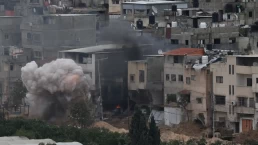Displaced from Jenin and Tulkarem, Palestinian residents say Israel is waging a deliberate campaign to make the northern refugee camps unlivable.
By Hanno Hauenstein, +972 Magazine
Sameera Abu Rmeleh steps over mountains of rubble and debris to reach what’s left of her home in Jenin refugee camp. It’s a cold, rainy day in the northern West Bank, and the camp is almost unrecognizable. Smashed concrete, burned-out cars, bullet casings, and the lifeless bodies of stray dogs line the streets as far as the eye can see. About 100 meters away, Israeli bulldozers and armored vehicles move around with purpose.
“What is happening now is much worse than the Second Intifada,” Abu Rmeleh says. “It’s just like Gaza — none of the houses in the camp are livable anymore. But we won’t go anywhere. We’re ready to live in tents if necessary. We’ve done it before.”
Abu Rmeleh is one of 20,000 Palestinians forcibly displaced from their homes in Jenin camp in recent weeks as a result of an ongoing Israeli military operation in the area. Taking what little they could carry, families fled on foot in the early days of the invasion along a dirt road, torn up by Israeli bulldozers, while soldiers choked off movement in and out of the camp.

Since then, roads throughout the camp have been gutted, including key access routes to Jenin Government Hospital. Israeli forces have also destroyed water, sewage, and telecommunications infrastructure, and even leveled an entire residential block through controlled detonations.
Now in its fifth week, “Operation Iron Wall” has since expanded to three more refugee camps in the northern West Bank, displacing an additional 20,000 people from Tulkarem camp, Nur Shams camp, and Al-Far’a camp. The Israeli military claims to be targeting armed resistance groups in these areas, but has produced meager evidence of its achievements in this regard. And as soldiers lay waste to civilian infrastructure on the ground, fighter jets and drones drop missiles from the sky.
Recent Posts
New Addition to List of Nuclear Near Catastrophes
February 25, 2026
Take Action Now Debris flew for great distances — many times the distance of 270 meters to a nuclear reactor and nuclear storage facility.By David…
Gavin Newsom’s last budget belies his ‘California for All’ pledge
February 24, 2026
Take Action Now Yet, even as the state is poised to lose billions in federal funding, and millions of Californians are losing access to health care…
Israel and American Hawks are Pushing U.S. to Iran War With Catastrophic Consequences
February 23, 2026
Take Action Now At the World Health Assembly in May, member states may endorse an unprecedented strategy declaring that health is not a cost – but…
A Child’s View of the Attack on Venezuela. And a Peace Flotilla
February 23, 2026
Take Action Now Fabricio said that he and his family went out of their building and saw many people also going outside, running around, and kids…




